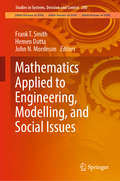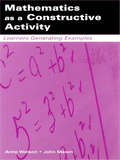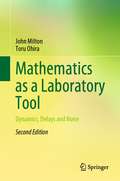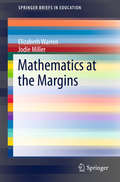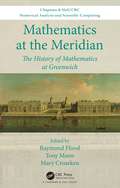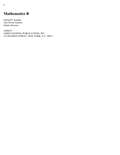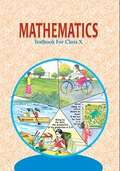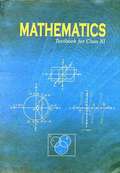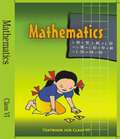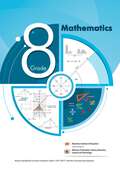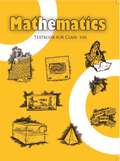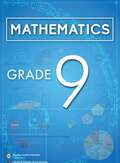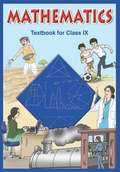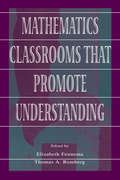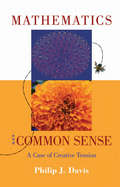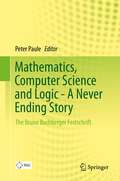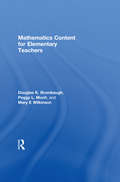- Table View
- List View
Mathematics Applied to Engineering, Modelling, and Social Issues (Studies in Systems, Decision and Control #200)
by John N. Mordeson Hemen Dutta Frank T. SmithThis book presents several aspects of research on mathematics that have significant applications in engineering, modelling and social matters, discussing a number of current and future social issues and problems in which mathematical tools can be beneficial. Each chapter enhances our understanding of the research problems in a particular an area of study and highlights the latest advances made in that area. The self-contained contributions make the results and problems discussed accessible to readers, and provides references to enable those interested to follow subsequent studies in still developing fields. Presenting real-world applications, the book is a valuable resource for graduate students, researchers and educators. It appeals to general readers curious about the practical applications of mathematics in diverse scientific areas and social problems.
Mathematics as a Constructive Activity: Learners Generating Examples (Studies in Mathematical Thinking and Learning Series)
by Anne Watson John MasonThis book explains and demonstrates the teaching strategy of asking learners to construct their own examples of mathematical objects. The authors show that the creation of examples can involve transforming and reorganizing knowledge and that, although this is usually done by authors and teachers, if the responsibility for making examples is transferred to learners, their knowledge structures can be developed and extended. A multitude of examples to illustrate this is provided, spanning primary, secondary, and college levels. Readers are invited to learn from their own past experience augmented by tasks provided in the book, and are given direct experience of constructing examples through a collection of many tasks at many levels. Classroom stories show the practicalities of introducing such shifts in mathematics education. The authors examine how their approach relates to improving the learning of mathematics and raise future research questions.*Based on the authors' and others' theoretical and practical experience, the book includes a combination of exercises for the reader, practical applications for teaching, and solid scholarly grounding.*The ideas presented are generic in nature and thus applicable across every phase of mathematics teaching and learning.*Although the teaching methods offered are ones that engage learners imaginatively, these are also applied to traditional approaches to mathematics education; all tasks offered in the book are within conventional mathematics curriculum content.Mathematics as a Constructive Activity: Learners Generating Examples is intended for mathematics teacher educators, mathematics teachers, curriculum developers, task and test designers, and classroom researchers, and for use as a text in graduate-level mathematics education courses.
Mathematics as a Laboratory Tool: Dynamics, Delays and Noise
by John Milton Toru OhiraThe second edition of Mathematics as a Laboratory Tool reflects the growing impact that computational science is having on the career choices made by undergraduate science and engineering students. The focus is on dynamics and the effects of time delays and stochastic perturbations (“noise”) on the regulation provided by feedback control systems. The concepts are illustrated with applications to gene regulatory networks, motor control, neuroscience and population biology. The presentation in the first edition has been extended to include discussions of neuronal excitability and bursting, multistability, microchaos, Bayesian inference, second-order delay differential equations, and the semi-discretization method for the numerical integration of delay differential equations. Every effort has been made to ensure that the material is accessible to those with a background in calculus. The text provides advanced mathematical concepts such as the Laplace and Fourier integral transforms in the form of Tools. Bayesian inference is introduced using a number of detective-type scenarios including the Monty Hall problem.
Mathematics at the Margins
by Elizabeth Warren Jodie MillerThis book reports the impact a four-year longitudinal study (Representations, Oral Language and Engagement in Mathematics (RoleM)) had on teachers and students from 16 schools in disadvantaged contexts. It offers theories with regard to the interplay between teaching and learning mathematics as teachers and students in these contexts implement a mathematics program. The data are longitudinal, drawn from 154 teachers and their students (up to 1738 students) from the first four years of school (Foundation to Year 3). To ascertain the effectiveness of the RoleM Professional Learning model, teachers were interviewed three times a year and pre and post-tests were administered to students at the beginning and end of each year. Students' results indicated that all students' understanding of mathematics improved significantly, with the ESL students showing the greatest gains. Their results matched the norm-referenced expectations for all Australian students of this age. This book shares the journey of these teachers, Indigenous teacher aides and students. It outlines the dimensions of the research findings that supported teachers to become effective teachers of mathematics and assisted students in becoming successful learners of mathematics. The book also draws on the expertise of researchers from both Canada and New Zealand. They share the similarities and the differences between RoleM findings and their own contexts, in order to draw general conclusions for the effective teaching and learning of mathematics at the margins of society.
Mathematics at the Meridian: The History of Mathematics at Greenwich (Chapman & Hall/CRC Numerical Analysis and Scientific Computing Series)
by Raymond Flood Tony Mann Mary CroarkenGreenwich has been a centre for scientific computing since the foundation of the Royal Observatory in 1675. Early Astronomers Royal gathered astronomical data with the purpose of enabling navigators to compute their longitude at sea. Nevil Maskelyne in the 18th century organised the work of computing tables for the Nautical Almanac, anticipating later methods used in safety-critical computing systems. The 19th century saw influential critiques of Charles Babbage’s mechanical calculating engines, and in the 20th century Leslie Comrie and others pioneered the automation of computation. The arrival of the Royal Naval College in 1873 and the University of Greenwich in 1999 has brought more mathematicians and different kinds of mathematics to Greenwich. In the 21st century computational mathematics has found many new applications. This book presents an account of the mathematicians who worked at Greenwich and their achievements. Features A scholarly but accessible history of mathematics at Greenwich, from the seventeenth century to the present day, with each chapter written by an expert in the field The book will appeal to astronomical and naval historians as well as historians of mathematics and scientific computing.
Mathematics: Bullet Guides
by Sophie GoldieOpen this book and you will Be numerate Understand key principles Conquer difficult problems Handle data confidently
Mathematics class 10 - Andhra Pradesh Board
by Government of Andhra Pradesh HyderabadAndhra Pradesh board Mathematics text book for standard 10
Mathematics class 10 - Meghalaya Board
by Meghalaya Board of School EducationCreated and published by the Meghalaya School Board of School Education, the textbook for class 10 helps the students to understand various basics for higher level maths and prepare them for the examinations. Written in simple english language the book is full of solved examples for the students to understand the concept better.
Mathematics class 10 - NCERT - 23
by National Council of Educational Research and TrainingThe NCERT Mathematics Textbook for Class X, designed for the 10th grade students in India under the CBSE, covers essential topics to build foundational knowledge. It begins with "Real Numbers", introducing Euclid’s Division Lemma, the Fundamental Theorem of Arithmetic, and delving into the nature of irrational numbers and the decimal representation of rational numbers. The "Polynomials" section provides a geometrical interpretation of the zeros of a polynomial, explores the relationship between zeros and coefficients, and covers polynomial division. Subsequent chapters introduce students to linear equations, quadratic equations, arithmetic progressions, and coordinate geometry, among other topics. The textbook also delves into trigonometry, touching upon various trigonometric identities and their applications. Basic concepts of geometry, like circles and constructions, are elucidated with precision. The textbook ends by acquainting students with probability, statistics, and applications of real-world problems. Overall, it provides a comprehensive overview of fundamental mathematical concepts, preparing students for more advanced studies.
Mathematics class 11 - NCERT - 23
by National Council of Educational Research and TrainingNCERT's Class 11 Mathematics book provides a comprehensive foundation in fundamental math concepts and their applications. It covers sets, functions, algebra, coordinate geometry, calculus, mathematical reasoning, statistics, and probability. With a practical approach, it builds problem-solving skills and logical thinking. Through examples and exercises, students connect theory to real-life scenarios. An invaluable resource for exam preparation and future math studies.
Mathematics class 6 - NCERT - 23
by National Council of Educational Research and TrainingThe NCERT Mathematics textbook for Class VI serves as a comprehensive guide introducing fundamental mathematical concepts to students. The book is structured to provide a strong foundation in arithmetic, geometry, and basic algebraic concepts. It begins by laying a solid groundwork in numbers, focusing on understanding whole numbers, fractions, decimals, and their operations. The textbook then progresses to explore geometry, covering shapes, lines, angles, and symmetry, encouraging visual learning and problem-solving. Furthermore, it introduces students to basic algebraic concepts through patterns, equations, and understanding of variables. Each chapter is designed with clarity, using practical examples, illustrations, and exercises to reinforce learning. The book aims to not only impart mathematical knowledge but also foster critical thinking, problem-solving skills, and an appreciation for the application of mathematics in everyday life.
Mathematics class 7 - MIE
by Mauritius Institute of EducationThe Grade 7 Mathematics textbook, authored by Professor Vassen Naëck and a team from the Mauritius Institute of Education, serves as a vital resource in aligning with the National Curriculum Framework, guiding students through a seamless transition from Grade 6 to secondary education. Its comprehensive content spans Numbers, Algebra, Measures, Geometry, and Probability + Statistics, emphasizing problem-solving and real-world applications. Utilizing a pedagogical approach that prioritizes sense-making and reasoning, the textbook integrates digital tools like GeoGebra to deepen understanding. With various icons highlighting activities, exercises, and notes, the text promotes interactive and engaging learning experiences, fostering a deeper comprehension of mathematical concepts.
Mathematics class 7 - NCERT - 23
by National Council of Educational Research and TrainingThe NCERT Class 7 Mathematics textbook provides a comprehensive and structured approach to mathematical concepts for students. It covers a wide range of topics, including integers, fractions, decimals, geometry, algebra, and data handling. The book aims to develop a strong foundation in mathematical principles by introducing students to real-life applications and problem-solving techniques. Through engaging and interactive exercises, the textbook encourages active participation, fostering a deeper understanding of mathematical concepts. It emphasizes conceptual clarity, logical reasoning, and practical application, preparing students for more advanced mathematical studies. Additionally, the textbook incorporates activities that promote critical thinking, making the learning process enjoyable and meaningful for Class 7 students. Overall, the NCERT Class 7 Mathematics textbook is designed to instill a love for mathematics while equipping students with essential skills for their academic journey.
Mathematics class 8 - MIE
by Mauritius Institute of EducationThe Grade 8 Mathematics textbook by the Mauritius Institute of Education, published in 2021, presents a comprehensive curriculum aligned with the National Curriculum Framework. It covers diverse mathematical topics, including number sequences, indices, rate and proportion, coordinates, algebra, and geometry. Each chapter begins with clear learning objectives and provides ample exercises, examples, and summaries to aid comprehension. Emphasizing real-life applications, the textbook illustrates concepts such as Fibonacci sequences in nature and architectural scales, fostering contextual learning. The educational content is meticulously crafted to enhance learners' cognitive skills through practical activities and contextualized problem-solving. This textbook serves as an invaluable resource for Grade 8 students, facilitating their mathematical understanding and application in various real-world scenarios.
Mathematics class 8 - NCERT - 23
by National Council of Educational Research and TrainingThe Mathematics textbook for Class VIII by NCERT provides a comprehensive and structured approach to fundamental mathematical concepts for students at the eighth-grade level. The textbook covers a wide range of topics, including number systems, algebraic expressions and equations, geometry, mensuration, data handling, and practical geometry. With a focus on building problem-solving skills, the book incorporates real-life examples and engaging exercises to enhance students' understanding of mathematical principles. Through a balanced mix of theory and application, it aims to develop a solid foundation in mathematics, promoting logical reasoning and analytical thinking. The textbook aligns with the NCERT curriculum, ensuring that students acquire a strong mathematical foundation that will serve as a basis for their academic journey.
Mathematics class 9 - Goa Board
by National Council of Educational Research and TrainingThe Class IX Mathematics textbook by NCERT (National Council of Educational Research and Training) is a comprehensive resource designed to provide students with a strong foundation in mathematical concepts. The book covers a wide array of topics, including real numbers, polynomials, coordinate geometry, linear equations in two variables, Euclid's geometry, lines and angles, triangles, quadrilaterals, areas of parallelograms and triangles, circles, constructions, surface areas and volumes, statistics, and probability. Each chapter is meticulously structured to foster a deep understanding of mathematical principles, offering clear explanations, solved examples, and exercises that progressively challenge students' skills. The textbook emphasizes problem-solving strategies, logical reasoning, and practical applications, ensuring that students not only grasp mathematical theories but also develop problem-solving skills crucial for real-life situations. Additionally, it aligns with the NCERT curriculum, providing a balanced approach to mathematical concepts that encourages students to explore, analyze, and appreciate the beauty and utility of mathematics in everyday life.
Mathematics class 9 - MIE
by Mauritius Institute of EducationPublished by the Mauritius Institute of Education in 2021, the Grade 9 mathematics textbook offers a comprehensive alignment with the National Curriculum Framework, prioritizing the enhancement of learners' cognitive abilities through contextualized materials. Covering a range of topics including indices, binomial expressions, quadratics, and algebraic manipulation, the textbook incorporates exercises and continuous assessments to reinforce learning. Rooted in Variation Theory, the pedagogical approach aims to facilitate students' discernment of key concepts within each topic, fostering procedural fluency. This collaborative effort between MIE academics and seasoned educators ensures the delivery of high-quality content that effectively meets educational objectives, providing students with a solid foundation in mathematics.
Mathematics class 9 - NCERT
by National Council of Educational Research and TrainingMathematics Textbook For Class IX has been designed in a way so as to enable students to tackle difficult mathematical problems with ease. Published by NCERT, this book comprehensively covers the curriculum for the CBSE board and provides convenient ways of solutions to various numerical problems. The textbook has copious diagrams and solved examples to facilitate easier understanding and better adaptability among students. Unnecessary jargon is kept at bay, making mathematics more interesting for the students. Every topic is supported with abundant solved examples and practice sums to constitute a complete learning experience.
Mathematics class 9 - NCERT- 23
by National Council of Educational Research and Training"Mathematics: Class 9" by NCERT is a comprehensive textbook designed to facilitate a deeper understanding of fundamental mathematical concepts for students at the ninth-grade level. The book covers a wide range of topics including number systems, algebraic expressions, geometry, statistics, and probability. Each chapter is structured to provide clear explanations, examples, and exercises to reinforce learning. It emphasizes problem-solving skills, critical thinking, and mathematical reasoning through practical applications and real-life scenarios. With its systematic approach and engaging presentation, the textbook aims to equip students with the necessary skills and knowledge to excel in mathematics and build a strong foundation for future learning in the subject.
Mathematics class 9 - Tamil Nadu Board
by Government Of TamilnaduMathematics Textbook For Class IX has been designed in a way so as to enable students to tackle difficult mathematical problems with ease. Published by SCERT, this book comprehensively covers the curriculum for the board and provides convenient ways of solutions to various numerical problems. The textbook has copious diagrams and solved examples to facilitate easier understanding and better adaptability among students. Unnecessary jargon is kept at bay, making mathematics more interesting for the students. Every topic is supported with abundant solved examples and practice sums to constitute a complete learning experience.
Mathematics Classrooms That Promote Understanding (Studies in Mathematical Thinking and Learning Series)
by Elizabeth Fennema Thomas A. RombergMathematics Classrooms That Promote Understanding synthesizes the implications of research done by the National Center for Research in Mathematical Sciences on integrating two somewhat diverse bodies of scholarly inquiry: the study of teaching and the study of learning mathematics. This research was organized around content domains and/or continuing issues of education, such as equity and assessment of learning, and was guided by two common goals--defining the mathematics content of the K-12 curriculum in light of the changing mathematical needs of citizens for the 21st century, and identifying common components of classrooms that enable students to learn the redefined mathematics with understanding. To accomplish these goals, classrooms in which instruction facilitated the growth of understanding were established and/or studied. This volume reports and discusses the findings which grew out of this research, and subsequent papers and discussions among the scholars engaged in the endeavor. Section I, "Setting the Stage," focuses on three major threads: What mathematics should be taught; how we should define and increase students' understanding of that mathematics; and how learning with understanding can be facilitated for all students. Section II, "Classrooms That Promote Understanding," includes vignettes from diverse classrooms that illustrate classroom discourse, student work, and student engagement in the mathematics described in Chapter 1 as well as the mental activities described in Chapter 2. These chapters also illustrate how teachers deal with the equity concerns described in Chapter 3. Section III addresses "Developing Classrooms That Promote Understanding." The knowledge of the teaching/learning process gained from the research reported in this volume is a necessary prerequisite for implementing the revisions called for in the current reform movement. The classrooms described show that innovative reform in teaching and learning mathematics is possible. Unlike many volumes reporting research, this book is written at a level appropriate for master's degree students. Very few references are included in the chapters themselves; instead, each chapter includes a short annotated list of articles for expanded reading which provides the scholarly basis and research substantiation for this volume.
Mathematics & Common Sense: A Case of Creative Tension
by Philip J. DavisFrom the Preface: This book is addressed to all who are curious about the nature of mathematics and its role in society. It is neither a text book nor a specialists' book. It consists of a number of loosely linked essays that may be read independently and for which I have tried to provide a leitmotif by throwing light on the relationship between mathematics and common sense. In these essays I hope to foster a critical attitude towards both the existence of common sense in mathematics and the ambiguous role that it can play.
Mathematics, Computer Science and Logic - A Never Ending Story
by Peter PauleThis book presents four mathematical essays which explore the foundations of mathematics and related topics ranging from philosophy and logic to modern computer mathematics. While connected to the historical evolution of these concepts, the essays place strong emphasis on developments still to come The book originated in a 2002 symposium celebrating the work of Bruno Buchberger, Professor of Computer Mathematics at Johannes Kepler University, Linz, Austria, on the occasion of his 60th birthday. Among many other accomplishments, Professor Buchberger in 1985 was the founding editor of the Journal of Symbolic Computation; the founder of the Research Institute for Symbolic Computation (RISC) and its chairman from 1987-2000; the founder in 1990 of the Softwarepark Hagenberg, Austria, and since then its director More than a decade in the making, Mathematics, Computer Science and Logic - A Never Ending Story includes essays by leading authorities, on such topics as mathematical foundations from the perspective of computer verification; a symbolic-computational philosophy and methodology for mathematics; the role of logic and algebra in software engineering; and new directions in the foundations of mathematics. These inspiring essays invite general, mathematically interested readers to share state-of-the-art ideas which advance the never ending story of mathematics, computer science and logic Mathematics, Computer Science and Logic - A Never Ending Story is edited by Professor Peter Paule, Bruno Buchberger's successor as director of the Research Institute for Symbolic Computation.
Mathematics Content for Elementary Teachers
by Douglas K. Brumbaugh Peggy L. Moch MaryE WilkinsonTHE book for elementary education mathematics content courses! Designed to help prospective teachers of elementary school mathematics learn content beyond the rote level, this text stimulates readers to think beyond just getting the problem right and fosters their development into thoughtful, reflective, self-motivated, life-long learners. It stresses the what and why of elementary school mathematics content. Hints are provided about how to teach the content but this is mostly left to courses and texts that are dedicated to that purpose.The text is organized around the National Council for Teachers of Mathematics' Principles and Standards for School Mathematics. The Standards dictate the basic sections of the text. Within each section, appropriate specific topics are developed, intertwined with technology, problem solving, assessment, equity issues, planning, teaching skills, use of manipulatives, sequencing, and much more. In addition, major focal points of the Standards are emphasized throughout: effective teachers of mathematics should be able to motivate all students to learn, should understand the developmental levels of how children learn, should concentrate on what children need to become active participants in the learning environment, and should be engaged in ongoing investigations of new mathematical concepts and teaching strategies.Mathematics Content for Elementary Teachers is based on several fundamental premises:*The focus of mathematics education should be on the process, not the answer.*Elementary teachers should know the mathematics content they are teaching, know more than the content they are teaching, and teach from the overflow of knowledge.*It is important for teachers to be flexible in allowing students to use different procedures--teaching from the "overflow of knowledge" implies knowing how to do a given operation more than one way and being willing to examine many different ways.*Teachers need to learn to carefully cover the topics to be taught, to reflect upon them, and to be able to organize them. To help prospective elementary teachers concentrate on the mathematics content they will be expected to teach and begin to build the foundation for the methods they will use, this text includes only elementary mathematics content and does not address middle school concepts.Pedagogical features:*The text is organized according to NCTM Standards.*An informal writing style speaks directly to readers and is geared to pre-service teachers.*Focus is given to multiple methods of problem solving at four developmental levels.*Questions, exercises, and activities are interspersed throughout each section rather than gathered at the end of each chapter.*Complete solutions for exercises are provided.
